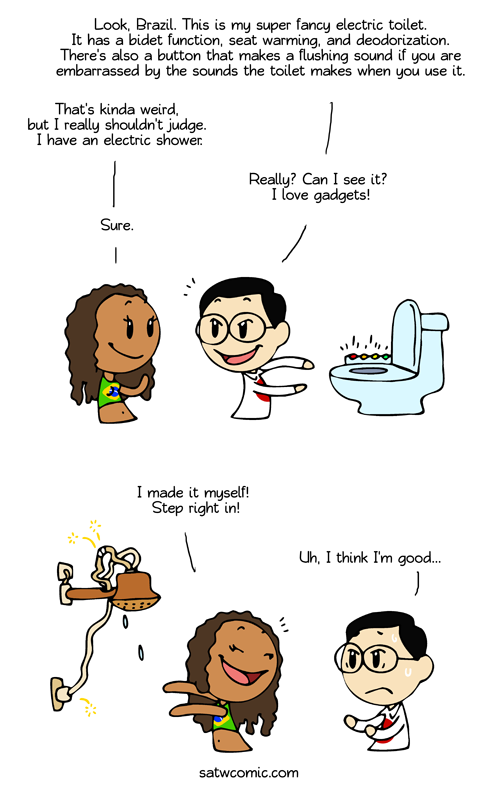10 years ago #9511196
14
0
Huehuehuehue it’s always funny to watch the the look of despair on the gringos face when they see our electric showers (brazilian here btw). It’s something we’re already used to, like the australians playing with their deadly animals. Normally these showers are safe, you only have to be careful while you are manipulating them (months ago I almost got myself electrocuted while repairing my brother’s shower, he turned off the wrong electric switch).
Fun fact (a positive outcome): since most of the foreign countries dont use this technology, brazilian companies developed an up-to-date technology in electrical resistence and circuits for temperature control, which in consequence, are also largely employed in the ceramic industry (trust me, I’m an engineer).
Fun fact (a positive outcome): since most of the foreign countries dont use this technology, brazilian companies developed an up-to-date technology in electrical resistence and circuits for temperature control, which in consequence, are also largely employed in the ceramic industry (trust me, I’m an engineer).
10 years ago #9511032
10
0
Indeed. I first came across these showers when visiting Nicaragua. I was always terrified that I would either get electrocuted or die in a fire. And yes, one day one of those contraption caught on fire. "My shower is on fire" is a strange sentence.
10 years ago #9511550
6
0
Bah...... That's nothing.. my friend just installed a hot shower.....
https://artgrappler.files.wordpress.com/2014/03/augij6y.jpg
:P
https://artgrappler.files.wordpress.com/2014/03/augij6y.jpg
:P
10 years ago #9511177
6
0
Ah, yes! The electric showers! There's nothing better than a refreshing dose of electricity to your body when trying to adjust the temperature of the water. I had a shower that did that every time. Every. Single. Time. Ah, the memories... -gazes the horizon nostalgically-
On a side note, nice to see you Brazil. I feel so... Represented.
On a side note, nice to see you Brazil. I feel so... Represented.
10 years ago #9512174
4
0
I remember when I was in Japan the first time and the hotel we stayed at had toilets that opened the lid themself when you came into the restroom. My first thought was literally "Shit! Decepticon!" and one of my friends said his first thought was "So do I trust the transformer or not?"
9 years ago #9634049
3
0
A verdade dói na alma , quando você é brasileiro olha pra isso e você ver o seu banheiro e é realmente assim.
Add comment: Please Sign in or create an accout to comment.




 Support the comic on
Support the comic on 
























647
I bet Japan found that shower...
shocking.